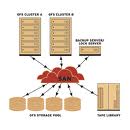This article introduces the Generalized Fourier Series (GFS), a novel spectral method that extends the clas- sical Fourier series to non-periodic functions. GFS addresses key challenges such as the Gibbs phenomenon and poor convergence in non-periodic settings by decomposing functions into periodic and aperiodic com- ponents. The periodic part is represented using standard Fourier modes and efficiently computed via the Fast Fourier Transform (FFT). The aperiodic component employs adaptive, low-rank sinusoidal functions with non-harmonic modes, dynamically tuned to capture discontinuities and derivative jumps across domain boundaries. Unlike conventional Fourier extension methods, GFS achieves high accuracy without requiring compu- tational domain extensions, offering a compact and efficient representation of non-periodic functions. The adaptive low-rank approach ensures accuracy while minimizing computational overhead, typically involving additional complex modes for the aperiodic part. Furthermore, GFS demonstrates a high-resolution power, with degrees of freedom comparable to FFT in periodic domains, and maintains N log2(N) computational complexity. The effectiveness of GFS is validated through numerical experiments, showcasing its ability to approximate functions and their derivatives in non-periodic domains accurately. With its robust framework and minimal computational cost, GFS holds significant potential for advancing applications in numerical PDEs, signal processing, machine learning, and computational physics by providing a robust and efficient tool for high-accuracy function approximations.
翻译:暂无翻译




